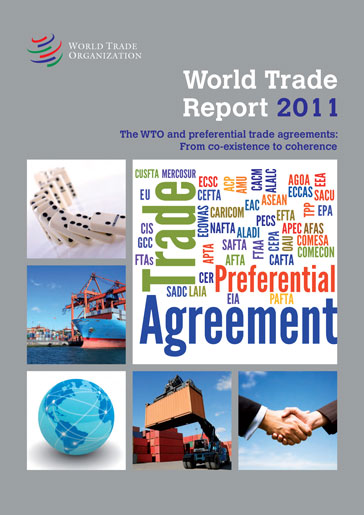RESEARCH AND ANALYSIS
Discussion forum: World Trade Report 2011 The WTO and preferential trade agreements: From co-existence to coherence
The discussion forum on preferential trade agreements (PTAs) received numerous valuable contributions over a nine month period. Its aim was to promote an open debate on themes relevant to PTAs and to allow people from a variety of backgrounds to interact and express their views regarding PTAs and the multilateral trading system.
We would like to take this opportunity to thank all the participants for their interesting insights into this topic and for making this forum a success.
Disclaimer
This forum seeks to promote an informed debate on new era preferential
trade agreements — the topic of the World Trade Report 2011. Documents
posted on the forum are the sole responsibility of their authors. They
have no legal effect on the rights and obligations of WTO members, nor
do they imply any judgement on the part of the WTO Secretariat regarding
the consistency of any policy with the provisions of the WTO agreements.
See also:
> World Trade Report 2010
> Discussion
forum: World Trade Report 2010
Background
Understanding the synergy and the possible incoherence between
preferential trade agreements(1)
and the multilateral trading system is crucial to determining what the
WTO’s future agenda on PTAs should be. In an era of offshoring and
global supply chains, we may be observing the emergence of a “new era”
of preferential trade agreements. These new era PTAs are not primarily
about preferential tariffs but about such issues as property rights,
establishment rights, repatriation of profits, temporary movement of
personnel, infrastructure services, trade facilitation, rules of origin,
and dispute settlement mechanisms accessible to private agents, which
are crucial to the success of production sharing networks.
Note:
1 This term is used in the academic literature to
refer to reciprocal free trade agreements and regional trade agreements.
This convention will be used throughout the report.
Recently submitted articles back to top
|
|
|---|---|
| 02/08/2011 | Regional integration in East Asia needs strong political commitment By Liudmila V. Popova and Vladimir N. Kovalenko |
| 02/08/2011 | Peculiarities and rationale of asymmetric regional trade agreements By Vladimir G. Sherov-Ignatiev and Sergei F. Sutyrin |
18/07/2011 |
“Is The WTO’s Article XXIV Bad?” |
18/07/2011 |
Are preferential agreements stepping stones to other markets? |
18/07/2011 |
Looking for Local Labor-Market Effects of the NAFTA |
18/07/2011 |
Member-Heterogeneity and the Common External Tariff in a Customs Union |
12/07/2011 |
Preferential Trade Agreements, Trade Creation and Trade Diversion |
12/07/2011 |
Impact of environmental regulations on trade in the main EU countries: conflict or synergy? |
05/07/2011 |
Africa needs a deeper integration agenda |
28/06/2011 |
Multilateralizing services preferences |
21/06/2011 |
The Political Economy of Regional Trade Agreements: General Interests versus Special Interests |
14/06/2011 |
“Multilateralizing regionalism” in Latin America and the Caribbean |
07/06/2011 |
Regional Integration and Trade Facilitation |
31/05/2011 |
Regional integration and North-South industrial location: An application to the Euro-Mediterranean area |
24/05/2011 |
Small Country Gains from North-South Preferential Liberalization: The Case of Honduras and DR-CAFTA |
17/05/2011 |
Completing the EU Customs Union. The Effects of Trade Procedure Harmonization |
10/05/2011 |
A Closer Look at East Asia’s Free Trade Agreements |
03/05/2011 |
Cross-Border Lobbying and External Tariffs in Preferential Trading Agreements |
19/04/2011 |
Advancing Trade Facilitation Reform: The Gains to Trade in ASEAN |
12/04/2011 |
Do democratic FTAs foster trade flows? |
06/04/2011 |
Preferential Trade Agreements and Services |
29/03/2011 |
Free Trade Agreements and the Consolidation of Democracy |
22/03/2011 |
Preferential Trade Agreements: Implementation Matters |
15/03/2011 |
Preferential Trading Arrangements as Strategic Positioning |
|
08/03/2011 |
Disaggregating PTAs and the Role of International Division of
Labor on PTA Formation |
|
01/03/2011 |
The implications for bananas of the recent trade agreements
between the EU and Andean and Central American countries |
22/02/2011 |
Preferential agreements, regional cooperation and standards |
15/02/2011 |
The Wedding of Trade and Human Rights: Marriage of Convenience or Permanent Match? |
08/02/2011 |
On the Relationship between Preferential and Multilateral Trade Liberalization: The Case of Customs Unions |
02/02/2011 |
Trade Agreements in Southeast Asia |
25/01/2011 |
How does trade respond to Preferential Trade Agreements? |
18/01/2011 |
Modelling Kemp-Vanek Admissibility: The Effects of Free Trade Areas on Non-Members |
11/01/2011 |
Explaining Nineteenth-Century Bilateralism: Economic and Political Determinants of the Cobden-Chevalier Network |
14/12/2010 |
Always Look at the Bright Side of Non-Delivery: WTO and
Preferential Trade Agreements, Yesterday and Today |
|
23/11/2010 |
Votes, Vetoes, and Preferential Trading Agreements |
|
01/11/2010 |
What will the World Trade Report 2011 be about? |
|
|
|

